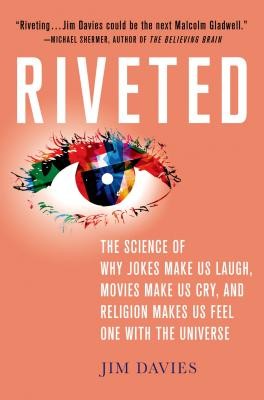
- Išsiųsime per 10–14 d.d.
- Autorius: Jim Davies
- Leidėjas: St. Martin's Press
- ISBN-10: 113727901X
- ISBN-13: 9781137279019
- Formatas: 16.2 x 24.7 x 2.6 cm, kieti viršeliai
- Kalba: Anglų
- Extra -15 % nuolaida šiai knygai su kodu: ENG15
Riveted: The Science of Why Jokes Make Us Laugh, Movies Make Us Cry, and Religion Makes Us Feel One with the Universe (el. knyga) (skaityta knyga) | knygos.lt
Atsiliepimai
Aprašymas
Why do some things pass under the radar of our attention, but other things capture our interest? Why do some religions catch on and others fade away? What makes a story, a movie, or a book riveting? Why do some people keep watching the news even though it makes them anxious?
The past 20 years have seen a remarkable flourishing of scientific research into exactly these kinds of questions. Professor Jim Davies' fascinating and highly accessible book, Riveted, reveals the evolutionary underpinnings of why we find things compelling, from art to religion and from sports to superstition. Compelling things fit our minds like keys in the ignition, turning us on and keeping us running, and yet we are often unaware of what makes these keys fit. What we like and don't like is almost always determined by subconscious forces, and when we try to consciously predict our own preferences we're often wrong. In one study of speed dating, people were asked what kinds of partners they found attractive. When the results came back, the participants' answers before the exercise had no correlation with who they actually found attractive in person! We are beginning to understand just how much the brain makes our decisions for us: we are rewarded with a rush of pleasure when we detect patterns, as the brain thinks we've discovered something significant; the mind urges us to linger on the news channel or rubberneck an accident in case it might pick up important survival information; it even pushes us to pick up People magazine in order to find out about changes in the social structure. Drawing on work from philosophy, anthropology, religious studies, psychology, economics, computer science, and biology, Davies offers a comprehensive explanation to show that in spite of the differences between the many things that we find compelling, they have similar effects on our minds and brains.EXTRA 15 % nuolaida su kodu: ENG15
Akcija baigiasi už 19:16:13
Nuolaidos kodas galioja perkant nuo 10 €. Nuolaidos nesumuojamos.

- Autorius: Jim Davies
- Leidėjas: St. Martin's Press
- ISBN-10: 113727901X
- ISBN-13: 9781137279019
- Formatas: 16.2 x 24.7 x 2.6 cm, kieti viršeliai
- Kalba: Anglų
Why do some things pass under the radar of our attention, but other things capture our interest? Why do some religions catch on and others fade away? What makes a story, a movie, or a book riveting? Why do some people keep watching the news even though it makes them anxious?
The past 20 years have seen a remarkable flourishing of scientific research into exactly these kinds of questions. Professor Jim Davies' fascinating and highly accessible book, Riveted, reveals the evolutionary underpinnings of why we find things compelling, from art to religion and from sports to superstition. Compelling things fit our minds like keys in the ignition, turning us on and keeping us running, and yet we are often unaware of what makes these keys fit. What we like and don't like is almost always determined by subconscious forces, and when we try to consciously predict our own preferences we're often wrong. In one study of speed dating, people were asked what kinds of partners they found attractive. When the results came back, the participants' answers before the exercise had no correlation with who they actually found attractive in person! We are beginning to understand just how much the brain makes our decisions for us: we are rewarded with a rush of pleasure when we detect patterns, as the brain thinks we've discovered something significant; the mind urges us to linger on the news channel or rubberneck an accident in case it might pick up important survival information; it even pushes us to pick up People magazine in order to find out about changes in the social structure. Drawing on work from philosophy, anthropology, religious studies, psychology, economics, computer science, and biology, Davies offers a comprehensive explanation to show that in spite of the differences between the many things that we find compelling, they have similar effects on our minds and brains.



Atsiliepimai